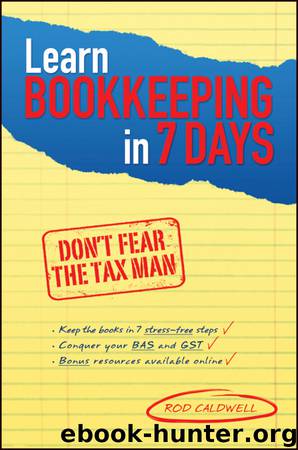Learn Bookkeeping in 7 Days by Rod Caldwell

Author:Rod Caldwell [Caldwell, Rod]
Language: eng
Format: epub
Publisher: Wiley
Published: 2010-05-03T23:00:00+00:00
Returns and allowances under accrual accounting
Have you ever bought a pair of shoes and later decided that you didn’t like them and then returned them to the store? This is a classic example of a return, but in business such returns are a little more complex. For example, if a stock line is not selling, instead of returning the goods you may seek a discount from the supplier. This is referred to as an allowance.
Returning goods purchased or sold
At some time we have all purchased an item that we have later returned for one reason or another. Returns of goods purchased, or returns to us of goods sold by us, are readily identified by the average consumer.
If you purchased/sold the goods on cash terms, you would simply receive/pay a cash refund processed through the cash receipts and cash payments journal. The document you would receive/issue is called an adjustment note (credit note) and is in all ways similar to a tax invoice, but with a negative cost indicated rather than a positive one. Since the introduction of the GST, the term ‘adjustment note’ is used rather than the older term ‘credit note’ because the return is handled as an adjustment in your BAS; however, many small companies treat returns as negative purchases/sales and simply show the net amount in the BAS. Either way is acceptable for returns within the BAS period but for out-of-period returns, the adjustment method is preferred.
If you purchased/sold the goods on credit terms, there are two scenarios that we have to cover. If the goods have been paid for and the account settled, the return is usually settled as a cash payment similar to the process just described for goods purchased/sold on cash terms, or alternatively as a credit settlement with the individual creditor’s/debtor’s account going into negative — to be utilised as a credit on the next purchase/sale. Which one you use will depend on whether or not the return relates to a supplier/customer with whom you have regular dealings, or if the transaction is just a one off. Sometimes the terms of trade will also dictate the type of refund given on returned goods.
Note
With regard to terms of trade, in both situations just described it is possible that the terms of trade will dictate that an adjustment note will be issued and that no cash refund will be given. Such terms are only legal for voluntary returns, that is, when the client changes its mind. In cases of statutory returns, that is, the return of goods under consumer law, a cash refund must be given if the purchase/sale was for cash, or if on credit terms and the account has been settled prior to the return taking place.
Download
This site does not store any files on its server. We only index and link to content provided by other sites. Please contact the content providers to delete copyright contents if any and email us, we'll remove relevant links or contents immediately.
Zero to IPO: Over $1 Trillion of Actionable Advice from the World's Most Successful Entrepreneurs by Frederic Kerrest(4571)
Machine Learning at Scale with H2O by Gregory Keys | David Whiting(4313)
Never by Ken Follett(3957)
Harry Potter and the Goblet Of Fire by J.K. Rowling(3857)
Ogilvy on Advertising by David Ogilvy(3622)
Shadow of Night by Deborah Harkness(3368)
The Man Who Died Twice by Richard Osman(3080)
Book of Life by Deborah Harkness(2939)
The Tipping Point by Malcolm Gladwell(2923)
Will by Will Smith(2920)
Purple Hibiscus by Chimamanda Ngozi Adichie(2855)
0041152001443424520 .pdf by Unknown(2846)
My Brilliant Friend by Elena Ferrante(2831)
How Proust Can Change Your Life by Alain De Botton(2814)
How to Pay Zero Taxes, 2018 by Jeff A. Schnepper(2655)
Hooked: A Dark, Contemporary Romance (Never After Series) by Emily McIntire(2555)
Rationality by Steven Pinker(2365)
Can't Hurt Me: Master Your Mind and Defy the Odds - Clean Edition by David Goggins(2341)
Borders by unknow(2315)
